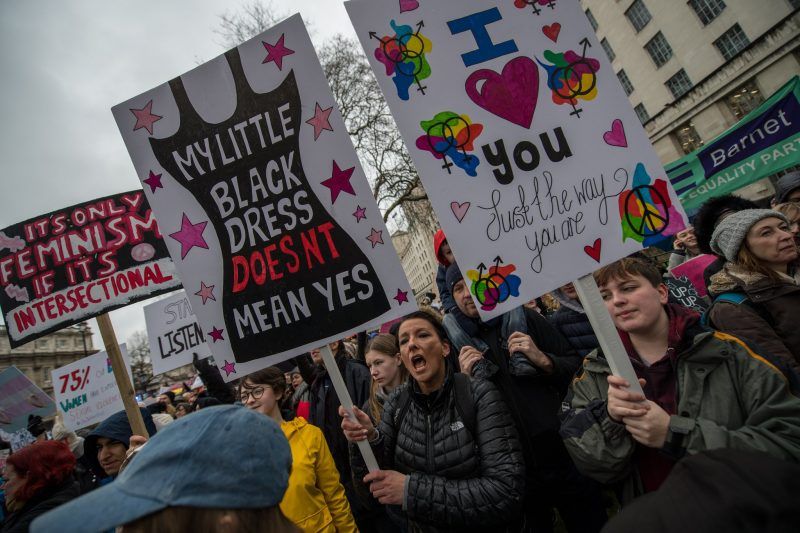
In the post-Harvey Weinstein era, every institution and public company in Britain has been piously claiming to be concerned with how women are viewed, heard, treated and paid. And yet last week, 360 rich and powerful men in Britain were happy to pay £2,000 a head (about $2,800) to attend an evening fund-raiser hosted by the Presidents Club Charitable Trust, during which their female peers and partners were excluded, and the only women in the room were there as miniskirted sex objects whose explicit duty was to serve — and stroke the egos of — the men.
You didn’t need to see or expect the harassment that followed to find this arrangement deeply suspect. The invitation promised gleefully that this would be “the most un-P.C. event of the year.” Half the tables were taken by men in the real estate industry; others on the guest list were financiers, restaurateurs, celebrities.
The fund-raising — for a children’s hospital — was just a fig leaf. This was a bonding and networking experience, bringing men together to exult in male dominance and sexual power, barring any women who might question or challenge them, and reducing women to decorative, accommodating, humiliating subservience.
The details of the dinner, exposed by the Financial Times, have undermined the organizers’ and guests’ claims not to have understood or noticed what the event was about. The evening began with the servers paraded across the stage, two by two. The brochures on every table had an entire page asking the men not to harass the women. That’s an extraordinary plea to have to make at a supposedly civilized event.
The women, given black dresses that only just reached their thighs and ordered to bring black “sexy shoes,” were also required to wear black underwear, clearly on the presumption that it would be seen. They were warned that the men would be “annoying,” but that they must “put up with it.” Their phones were locked away and they were made to sign five-page nondisclosure agreements.
They soon discovered why. The remorseless groping and contemptuous propositioning that the women had to endure for the next six hours left many of them distressed. Any who retreated to the restrooms for a brief escape were ordered back by male staff.
The crudity and the disparagement of women was encouraged from the stage, where the host, a television sports commentator, invited bids, starting at £10,000, for breast surgery “to add spice to your wife.” A woman was brought on stage, as if she were a prize horse or dog, so that the host could point to where she had been enhanced by the plastic surgery team.
Now the whole event has exploded in the organizers’ faces. The club has closed; a government minister was reprimanded by Prime Minister Theresa May for attending; the known guests are running for cover, conveniently claiming to have left early, or to have seen and heard and done nothing.
But why did these men think all of this was just fine? And why did they think they could get away with it?
The answer is obvious: because they always had before, and as far as this cohort of British society is concerned, nothing has really changed. Had it not been for The Financial Times sending a female reporter undercover to the event, they would have probably gotten away with it once more. This dinner has reportedly been running for 33 years. Its star guest in 2004 was the left-wing London mayor Ken Livingstone, who professed his fierce commitment to equality but at the time was obviously completely untroubled by an exploitative men’s event.
Eight years ago, the newspaper The Independent reported on the dinner as glamorous entertainment, calling it a “racy event” and quoting an attendee as saying, “The boys tucked into the girls.” Many of the men who go are self-made entrepreneurs from notoriously aggressive, sexist businesses. They may now feel compelled to make statements in support of women’s equality, but in private — protected and encouraged by their buddies and their nondisclosure agreements — they have assumed that they can continue to hog power and behave like boors.
That confidence has suddenly collapsed. The fury that has followed these revelations, with the prime minister, Britain’s most influential business lobbying group, senior politicians and women in the finance industry lining up to condemn everyone responsible, show how dangerous this kind of behavior now is for individuals and companies. Women have had enough of being “tucked into.” Suddenly, public morality is backing them up.
But what this event so painfully exposes is that public morality is not synonymous with private conviction. The second is much slower to shift. Men who seek out events like the Presidents Club’s, or who are furiously, resentfully defending them online as just “boys’ nights out,” or “what women should expect,” are not going to return to their homes or offices and treat the women there as equal, serious, and dignified. They like their dominance, and won’t easily give it up.
The Presidents Club debacle is just one milestone on women’s long, hazardous, often hidden fight to get men to accept that we are people, too.
Jenni Russell, a journalist and broadcaster, is a columnist for The Times of London.
